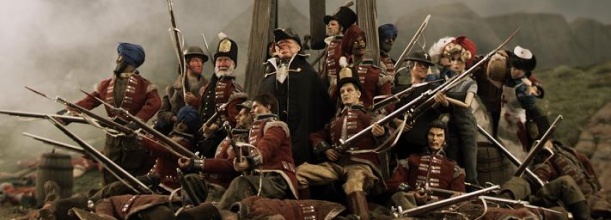Interview! We talk to Jackboots on Whitehall directors the McHenry Bros.

First impressions: the McHenry brothers are young. Really, really young. Ed and Rory are 27 and 23 respectively, and those are pretty damn tender ages when you’re directing Ewan McGregor and Richard O’Brien in an epic war film. The flick in question is the superb Jackboots on Whitehall, an animatronic WW2 riot due to open the Raindance Film Festival at the end of this month, and the McHenry brothers are sitting across from me in an empty Soho pub…
Right, first things first. You come from quite a filmtastic background – how did that influence your entry into the world of cinema?
Ed McHenry: Well, dad’s a production designer and mum’s an actress, so we’re from a second-generation film family – but that’s all on the crew side of things, so we didn’t have any contacts when it came to financing Jackboots.
Rory McHenry: Yeah, we really had to learn on the job. When you think of making a film it’s easy to forget the two, three – maybe even five years before you actually get on set, writing and rewriting and trying to raise the funds.
Ed: In some ways, that was the hardest part of making it – the actual filming went as smoothly as could be expected, but finding the money to make the film in the middle of a recession was no picnic. Imagine going to a financier with no producer and being asked “what’s your idea?” “We want to rewrite WW2… with puppets”. We got laughed at quite a lot, but we’re having the last laugh now!
So how did you manage to break into the sector and find your support?
Ed: Big question – that took longer than making the film itself. We started with this crazy idea and wrote up a treatment, and started taking it all round the houses to see who was interested. At this point it was going to be super low-budget – sub-£500k –  but we had the voices recorded fairly early on, so to all intents and purposes we had a cast attached.
but we had the voices recorded fairly early on, so to all intents and purposes we had a cast attached.
Rory: Then we found the right sort of people, got access to some real money, and we ended up making the film exactly as we’d imagined it. It was difficult to explain what we had in mind, but we managed to get a test shoot done – we made the scene in Churchill’s bunker (see right), and from then on it was much easier to get what we wanted to do across.
Blimey, sounds like a bit of a slog. After so much hassle, it was obviously a real coup to get such superb actors on board to voice the characters – how did you manage that?
Rory: It was a real surprise. We wrote down a wishlist for our casting director – “We want someone to sound like Richard E. Grant, we want someone to sound like Rosamund Pike…” – and they all signed up straight away. After all, it’s only two hours work in a recording studio and they get the chance to let their hair down a bit.”
Ed: The fantastic thing about making a film like this is that you can play around with the script – there’s no need to lip-synch, so Rory and I just sat in our living room with the lines on a laptop and rebuilt the dialogue. Everyone who joined the cast brought something new, so we were literally rewriting the script up until the last day of editing.
Terrific. Obviously, you chaps haven’t made a full-length film before – what was it like directing such veteran actors on your first feature?
Ed: I wouldn’t say it wasn’t scary, but as a director you have an obligation to get it right. But these guys were such consummate professionals, they came in and hit it straight away. You need so much training to have the sort of control you need for really good voiceover work – working with someone like Rosamund Pike, you can ask her to deliver a line 10% louder or whatever and she can genuinely work to those sorts of strictures. It’s stunning.
Rory: Jackboots would definitely not be the class of film it is if it wasn’t for the quality of its voice talent.
There are obvious advantages to not having to manipulate real actors on set – what are the real physical challenges when you’re making an Bruckheimer-esque film with a plastic cast?
Ed: Some aspects of it are great – wind and rain are no object, you just know you have a certain amount of time to shoot and that’s it – but even a truculent actor can take direction better than a mannequin.
Rory: When we were shooting the Battle of Britain the pilot puppet was strapped into the cockpit really tightly with his leather coat and so on, and then suddenly someone shouted “THE PUPPET’S ON FIRE!” – he’d just gone up in smoke under the studio lights.
Ed: Some of the puppets were really good – Major Rupee was brilliant, but Churchill was a bloody nightmare. Every once in a while he’d just be all *Churchill voice* “I don’t want to work with you, I’m going to set myself on fire!” They’d have to go into puppet hospital and get fixed up, then we’d crack on. We needed twice as long, to be honest – we shot for ten weeks and needed twenty, it was such hard work.
Rory: We were able to do so much with effects, though – we had greenscreens, CGI, the whole business.
Ed: We were trying to make it all as realistic as possible – we recorded tank guns firing, we had a real MG42, everything. The explosion in the Battle of Britain sequence blew out the lighting rig! We were working in a huge studio and it slammed the doors open, it was insane.
Speaking of ridiculous explosions, Jackboots has been called the British Team America – how do you feel about that?
Rory: It’s very flattering – Team America‘s a great movie, and the comparison is really helpful if you haven’t seen it, but they’re very different films. A lot of the humour in Team America was built round the fact that the characters are puppets, but Jackboots is filmed in a totally straight, self-contained world so it’d be really weird if the puppets started making jokes about the bolts on their wrists or whatever. The aim was always to make it like a real film – we moved towards making it even straighter and more gritty at one point, but I think we struck a nice balance in the end.
Ed: Another important difference was the music – Team America is full of sweary comic songs , but we wanted Jackboots to have a really atmospheric score.  The music is so fantastic – we said to Guy (Michelmore, the composer) we wanted something big and English and amazing. We had a 75-piece orchestra in Prague to record the score for these six-inch puppets performing a love scene!
The music is so fantastic – we said to Guy (Michelmore, the composer) we wanted something big and English and amazing. We had a 75-piece orchestra in Prague to record the score for these six-inch puppets performing a love scene!
Rory: He deserves an award for that score. The film’s ninety-one minutes long and we had something like eighty-three minutes of music – it really is wall-to-wall, it was a serious undertaking.
Pop culture junkies will have a great time spotting the references to iconic films all the way through – how much of that was deliberate and how much slipped in organically?
Ed: It took so long to make Jackboots that we started to forget all the references we’d put in!
Rory: We didn’t really sit down and think “Ooh, let’s reference Terminator 2 and get Himmler to stamp on a human skull”, it just grew out of all the films we’d watched over the years.
Ed: Those skulls cost £50 each! They were made of a special sort of sugar so they could be crushed by a mannequin jackboot, and every time we had to do a new take we were thinking “£50… bloody hell, another £50…”. There’s actually more references than you realise, they’re everywhere once you start looking.
We’ll certainly be looking out for them. Anyway, rumours abound that your next project is with Pamela Anderson – any gossip?
Rory: And Ed Westwick!
Ed: It’s a short film called The Commuter that we’re making with Nokia – the whole thing’s being filmed on the N8 video phone. It’s going to be an action comedy, six minutes of non-stop British comedy with American action. We’re shooting in two weeks!
And with that, the irrepressible McHenry brothers barrelled out of the pub on the way to their next engagement. If they bring as much energy and enthusiasm to The Commuter as they did to Jackboots – or, indeed, to our mile-a-minute chat – then it could be that rarest of beasts – a film in which you can watch dear old Pammy without wincing. If anyone can do it, they can.






Great article! Question: How do I contact the two brothers now? Thanks!